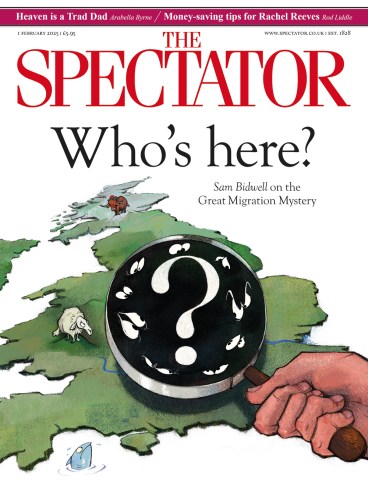
Two months ago, the Independent Press Standards Organisation (Ipso) upheld a complaint against The Spectator for referring to Juno Dawson, a transgender author, as ‘a man who claims to be a woman’. It may have struck some as unfathomable. I was less surprised. As I read the news, it took me back six years to when I was lead author of a report for Ipso, examining how the press treats trans-related issues.
I have been a management consultant for more than 30 years so am used to being asked by institutions as varied as the BBC and the Football Association to help shape strategy. For Ipso’s project, it effectively asked me to mark its homework. Was the press treating trans issues respectfully, and did this have anything to do with previous guidance on reporting on such matters?
Ipso insisted I refer to Karen White, a male rapist, as ‘she’. I had no choice but to comply
One of the things that Ipso is most concerned with is accuracy. So the methodology I proposed – reasonably I thought – was to establish the ‘truth’ around trans issues in order to gauge how accurately the press was treating trans people.
At first Ipso was happy to agree with this approach. The pushback started when it became clear that our understanding of the baseline was disputed by the LGBT lobby.
Part of my reason for wanting to find out the facts was that I was aware there was much I didn’t know about the core issues in the trans debate. If that were true of me, a gay man, it was likely to be true of many on the Ipso board.
I wasn’t even sure why the label LGBTQ+ had been adopted. When the T was added to the LGB by Stonewall back in 2015, I was puzzled by the combination. While being gay is about accepting your sex and your sexuality, being transsexual is about rejecting at least one of those. My thoughts went no further though, and this project for Ipso just four years later was the true beginning of my journey of discovery.
What I found baffling was, as I produced draft after draft of the report, using analysis based on quantitative and qualitative research, Ipso kept coming back with feedback effectively saying that ‘this is a highly contentious area and the report needs to balance the two sides of the argument’. It reflected the view that there are somehow two equally valid opinions in any argument about trans issues. I disagreed. It became clear to me that on one side was an unscientific and quasi-spiritual trans ideology (which should be treated by the media in the same way they treat religious beliefs), and on the other side, science and common sense.
Take pronouns. Ipso’s guidance included the suggestion that reports should use ‘the pronouns the individual uses to describe themselves’, which on the surface seemed harmless enough. But doing this is a far more loaded choice than it appears. It signals an acceptance of an entire ideological framework, one that isn’t based on observable science but on an abstract notion of ‘gender identity’.
For those who promote this ideology, a useful aspect of ‘gender identity’ is its name; it sounds technical, scientific almost. But the ‘gender identity’ of trans ideology is actually a quasi-spiritual, ghost-like entity, residing within each of us, and which has more importance than our observable sex. The ghost can be ‘male’, ‘female’ or something else, independent of the sex of the body it haunts. Because no male can know, apart from by observation and guesswork, what it is to be female (and vice versa), gender identity is the necessary foundational myth for trans ideology underpinning the axioms of the debate: that you can be ‘born in the wrong body’; that it is OK to ‘correct’ your body; that even a child can be trans and should have its gender reassigned; that males should have access to female spaces and sports; and, cannily, that your pronouns should refer to your gender identity, rather than your sex. The seemingly neutral act of calling a male ‘she’ – something actively encouraged by Ipso’s guidance – indicates acceptance of this ideology.
Ipso’s adherence to this position became more apparent in the edits I was instructed to make to my report. One case that stood out was that of Karen White, a male rapist who started ‘identifying’ as female after being remanded into custody. White was housed in a women’s prison, where he went on to assault inmates. The case raised an important point: when does the media have a responsibility to tell the truth about the sex of a person involved in a crime? Even though most editors I spoke to found it absurd to refer to White as ‘she’, some news reports included the surreal and scientifically inaccurate phrase ‘her penis’. How does that align with the accuracy Ipso claimed to prioritise? But when I tried to address this in my report, Ipso insisted I refer to White as ‘she’. I had no choice but to comply.
It became clear that Ipso wasn’t making these decisions in a vacuum and had been influenced by trans lobby groups, which were pushing to have ‘gender identity’ normalised in the media. At the time, groups such as Stonewall, Mermaids and On Road Media (now known as Heard) were lobbying hard to promote their narrative. Like many other institutions, Ipso seemed afraid of ‘getting it wrong’.
I saw how close Ipso’s relationship with these advocacy groups had become, and in particular, the tight relationship Ipso had with Mermaids. My client contact at Ipso and Mermaids’ CEO, Susie Green, had a warm, almost cosy tone to their exchanges. It felt less like neutral arbitration and more like an ideological alignment.
On the other side of my research, editors often told me they didn’t have the time or resources to dive into the nuances of trans debates, which are often much more complex than discussions about gay rights, so deferred to LGBT advocacy groups. But this wasn’t just about ‘love is love’. The question of whether a man who ‘identifies as a woman’ should be treated as female involves far more than personal freedom; it affects how we understand biology, as well as the safety of women.
Writing that report was a turning point. It made me question the principles of accuracy and fairness both in reporting and in how we manage our freedoms.
By the end of my time working for Ipso, it was hard to ignore the fact that it had clearly adopted the core principles of trans identity ideology. It could not claim to be a neutral arbitrator. I was surprised it took so long for that apparent bias to show up, as it seemed to in Ipso’s recent ruling against The Spectator.
Conrad was joined by Michael Gove on the latest Edition podcast to discuss what Ipso’s ruling means for free speech:








Comments